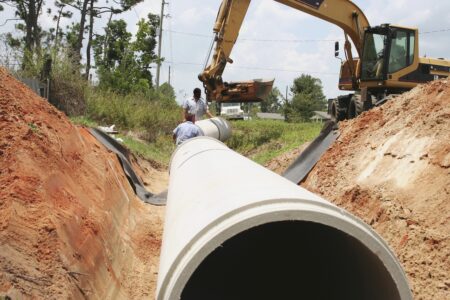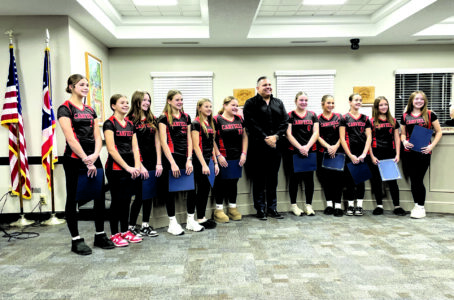Natives of Valley recount horrors of Calif. wildfires
WARREN — Wildfires ravaging California have transformed communities into desolate landscapes, with areas such as Pacific Palisades standing as stark examples of the flames’ devastation.
Born and raised in Warren, Mary Ann Groner, 68, has lived in the area for several years and is now navigating the harsh realities of the disaster that has uprooted the lives of her and her husband, Bob.
Another Warren native, Gina Lucarelli, who lives in Los Angeles County, also is grappling with the unfolding crisis around her.
State and local officials have described the wildfires as among the most catastrophic in recent history, with billions of dollars in damage and thousands of homes destroyed. The Pacific Palisades neighborhood Groner resided in — now reduced to a shell of its former self — was once a close-knit area, she said.
“My town, my bank, doctor, pharmacy, grocery store, are all gone,” she said.
“We weren’t all super rich,” Groner said, describing a community with modest homes and sprawling mansions, embodying a mix of middle-class families and notable figures like actor Anthony Hopkins, who lived just three doors down from her.
LIVING IN RV
Presence of wealth aside, Groner said many residents had lived there for decades, including retirees in their 90s with little means to rebuild.
“There were five widows on our block alone,” she said.
She and her husband’s home was a tear-down home before they invested in it and transformed it into a home they lived in for over 30 years.
Since the fire, Groner, her husband and their three dogs have relied on their RV as a temporary living quarters, parked at a campground away from the devastation.
Looking back on the day her life changed, Groner described a scene reminiscent of a war zone as she recalled flames creeping into visibility from the hilltop of her Pacific Palisades neighborhood.
“The air was thick with smoke and flames were everywhere. At one point, we had to break down a neighbor’s door to rescue their dog,” Groner said.
Fortunate enough to have an RV, she and her husband scrambled to pack as the flames ravaged their area.
“We didn’t even think to grab much. I just took an old hair towel that belonged to my father,” she said.
The small, sentimental item now is one of the few relics she has of her dad.
Groner recalled flames flanking both ends of the road as they escaped with their pets. Forgetting their pets’ medication, the couple barely made it down the road when Groner said her husband risked his life to retrieve the medication.
“The houses on both sides were fully engulfed,” Groner said. “He (Bob) said it was like a black blanket had been thrown over everything. His shoes melted and he couldn’t breathe, and the fire singed the top of his head, but he made it out with the medicine.”
“Police were yelling for people to get out of their cars and walk,” she said. “There were kids crying, people screaming and cars being bulldozed to clear the way.”
The scene was chaotic, with families scrambling to carry children and belongings as the fire got closer. The roads were gridlocked and the urgency of evacuation left little time for organization.
The devastation also left little time to save cherished items.
“The memories, the family photos, my mother’s wedding dress, all gone,” she said. “But I’m grateful we’re alive. I love my dogs, my husband and our RV. That’s my home now, and that’s enough for me.”
The aftermath is marred by battles with insurance companies and the daunting prospect of rebuilding.
“They’re low-balling everyone,” she said, expressing frustration shared among her neighbors facing struggles to recoup their losses. “We were only offered a third of what our home was worth.”
The couple is now looking to transition their lives back to Ohio. Groner said she has missed Warren and has longed to be back closer to thoughtful memories.
“There’s a solid attachment to the friends you grow up with,” she said, reflecting on the enduring bonds forged in her high school days growing up near the Trumbull Country Club. Those are memories that bring her comfort during difficult days.
“Long-term friends are different from people you meet later on. There’s a familiarity and bond that stays with you,” she said.
For her native Californian husband, leaving the state symbolizes a fresh start after decades of enduring its natural disasters.
“He couldn’t stand California anymore,” Groner said, adding that their new home offers not just safety but the promise of a quieter, more stable life.
GINA LUCARELLI
For others like Lucarelli, a professional dancer who relocated from Warren to Los Angeles three years ago, the wildfires also have brought disruption. Returning from a family visit in Warren, she was greeted not by the familiar sunny sprawl, but by something that had the makings of a disaster film. As her plane descended, Lucarelli recalled the captain warning passengers of the smoke and imminent darkness from the wildfires engulfing the region.
“I remember looking out the window, and it literally looked like an apocalypse,” she said, recounting the view of the fiery landscape from above. “…then all of a sudden, we just flew into complete darkness.” It was a stark contrast between the Los Angeles she knew and the eerie, smoke-choked version to which she was returning.
For almost a week, Lucarelli said she sought refuge with friends in Santa Clarita as the fires inched closer to her area.
“I packed emergency bags with my passport, important documents, medications and some memorabilia,” Lucarelli said.
Navigating through her Sherman Oaks neighborhood upon her return, Lucarelli described the immediate impact of the wildfires on her daily life. The smoke and ash cast a grim filter over everything, littering debris across the city.
“Driving through smoke, you couldn’t see… there’s just black everywhere from the smoke and the wind blowing it around,” she said.
Lucarelli said she is fortunate to be in the valley region of Los Angeles County, a portion of the area less impacted by the full weight of the Santa Ana winds.
As she settled back into a city under siege from Mother Nature, Lucarelli talked about returning to her job as a fitness and recovery specialist. She and others wore masks to combat the poor air quality. Her clients, she said, used their sessions as a getaway from the realities of how the fire has disrupted and uprooted lives.
Elsewhere, she said, “Everybody’s talking about it just so everybody’s more aware.”
Part of what has helped is technology.
The Watch Duty app, she noted, is a crucial tool for residents, providing real-time updates on how well-contained fires are at any given moment. The app also informs residents of nearby evacuation zones, which helped Lucarelli and others navigate the uncertainty.
She voiced concerns about climate change and the unusual wind patterns that have intensified the wildfires.
“The world is changing. There is climate change. It’s so dry here. I don’t even remember the last time it rained,” she said.
Recent reports indicate Santa Ana winds, the thickest of which are about 20 miles from Lucarelli, have reached gusts between 80 and 100 mph. Typically, the wind in the area sees speeds of 40-50 mph, according to Fox Weather. Meteorologist Ian Oliver said the unusual winds have been exacerbated by a dry spell that has produced little rain since the spring of 2024.
Lucarelli shared her view of how she’s seen her community respond to tragedy.
“LA has really come together. There’s dinners and meal centers for people to donate, take clothes,” she said. “Myself and a bunch of friends, you know, clean out your closet, find stuff that you know you haven’t needed. People lost everything. So just the community coming together in that way, that’s one thing that’s made it a positive reaction.”




